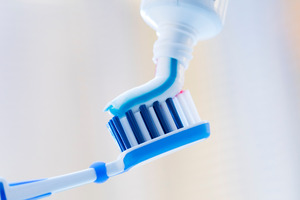
Veneers usually last around 10 years. To prolong their lifespan as much as possible, you need to take proper care of them on a daily basis. One of the most important steps is to brush your veneers the same way you brush your natural teeth. But what kind of toothpaste is right for the job? Here are some important facts that can help you choose the right oral hygiene products after getting veneers.
Why Do You Need to Brush Your Veneers?
Veneers can’t get cavities, but the teeth they cover still can. If bacteria start to build up on or around your veneers, they may eventually attack the underlying teeth, leading to tooth decay. If a cavity forms, your veneers might have to be removed so that the issue can be treated. Thus, you need to maintain excellent oral health if you want to keep your new smile – and naturally, that means brushing regularly.
Why Does the Kind of Toothpaste Matter?
Some types of toothpaste can actually be harmful to veneers. For example, certain toothpastes have abrasive ingredients to make them more effective at removing plaque. If you’re not careful with abrasive toothpaste, it could end up scratching your veneers.
Whitening toothpastes can also cause problems. Oftentimes they contain hydrogen peroxide and other whitening agents that are intended to help remove stains. Such agents can end up damaging your veneers, and as a result, you might need to have them replaced earlier than expected.
So What Kind of Toothpaste Should You Get?
When you’re buying new toothpaste after getting veneers, you should consider the following options:
- Gel Toothpastes: Compared to other types of toothpaste, gel toothpastes tend to be much gentler on veneers and other dental restorations. They are completely free of abrasive ingredients, meaning they’re less likely to cause damage.
- Non-Whitening Toothpastes: Check your toothpaste carefully to make sure it doesn’t contain any whitening agents. Your veneers will last a lot longer if you stick to non-whitening toothpastes.
- Fluoride Toothpastes: Fluoride helps strengthen your enamel and makes it more resistant to decay. By brushing with fluoride-based toothpaste, you can help ensure that the teeth covered by veneers stay healthy for as long as possible.
What About Your Toothbrush?
You also need to put some thought into the kind of toothbrush that you’re using. Some toothbrushes have hard bristles that can wear down the surfaces of your veneers even if you’re using a non-abrasive toothpaste. You should make sure that you always use a toothbrush with soft bristles.
If you want tips on how to take better care of your veneers, reach out to your dentist. They can answer any questions you might have about your oral hygiene routine and give you additional tips for picking the products that are best for your new smile.
About the Author
Dr. Ray Voller has over four decades of experience in the dental world. He studied dentistry at the University of Pittsburgh School of Dental Medicine, and he is a member of the American Academy of Cosmetic Dentistry. He often recommends veneers as a solution for patients who want to make multiple cosmetic corrections. To schedule a consultation with Dr. Voller at Voller Dentistry in Kittanning, visit his website or call (724) 543-4948.
